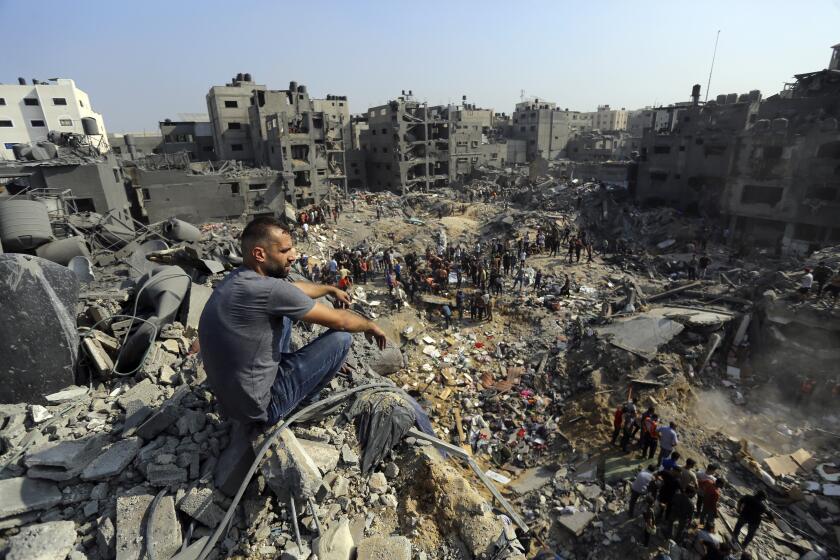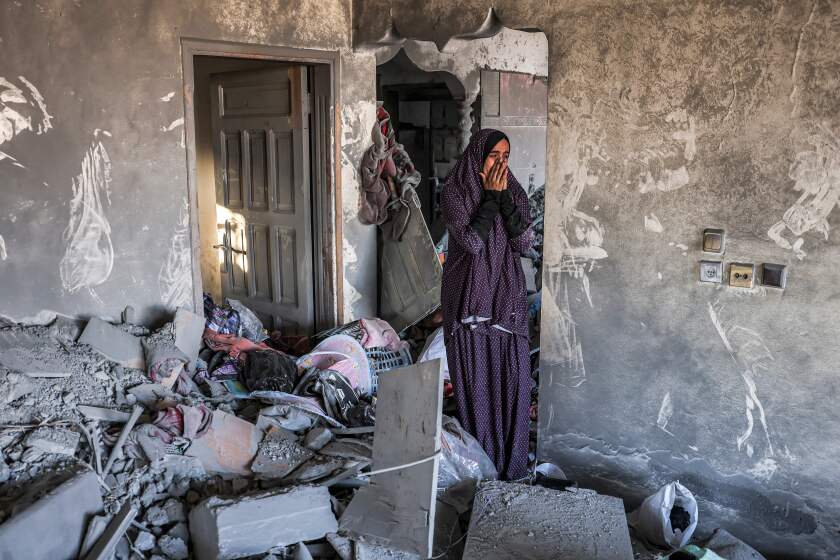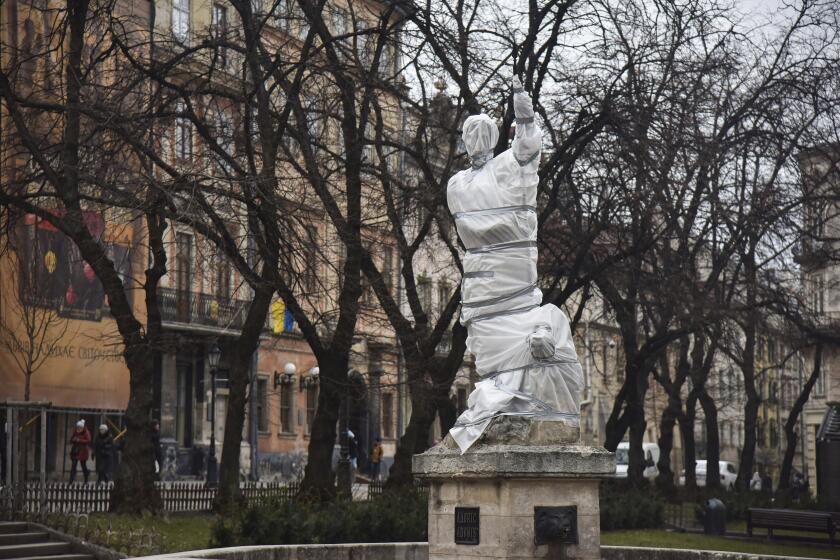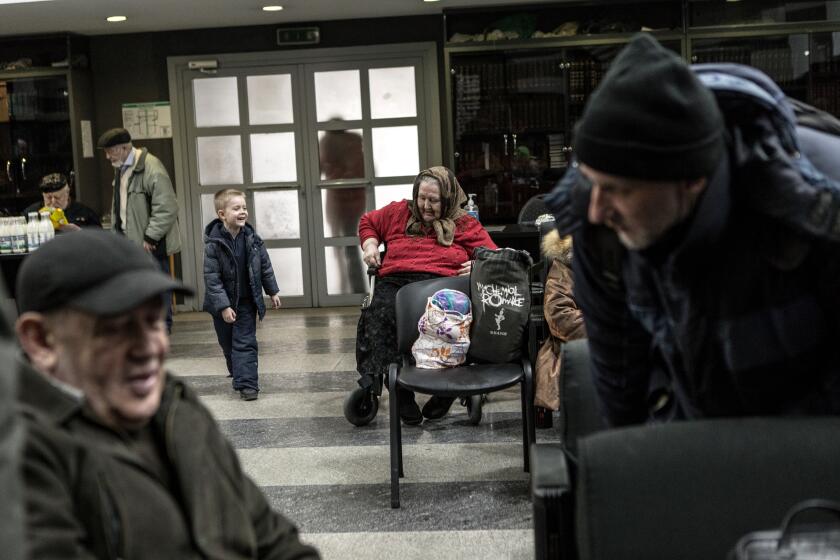When libraries like Gaza’s are destroyed, what’s lost is far more than books
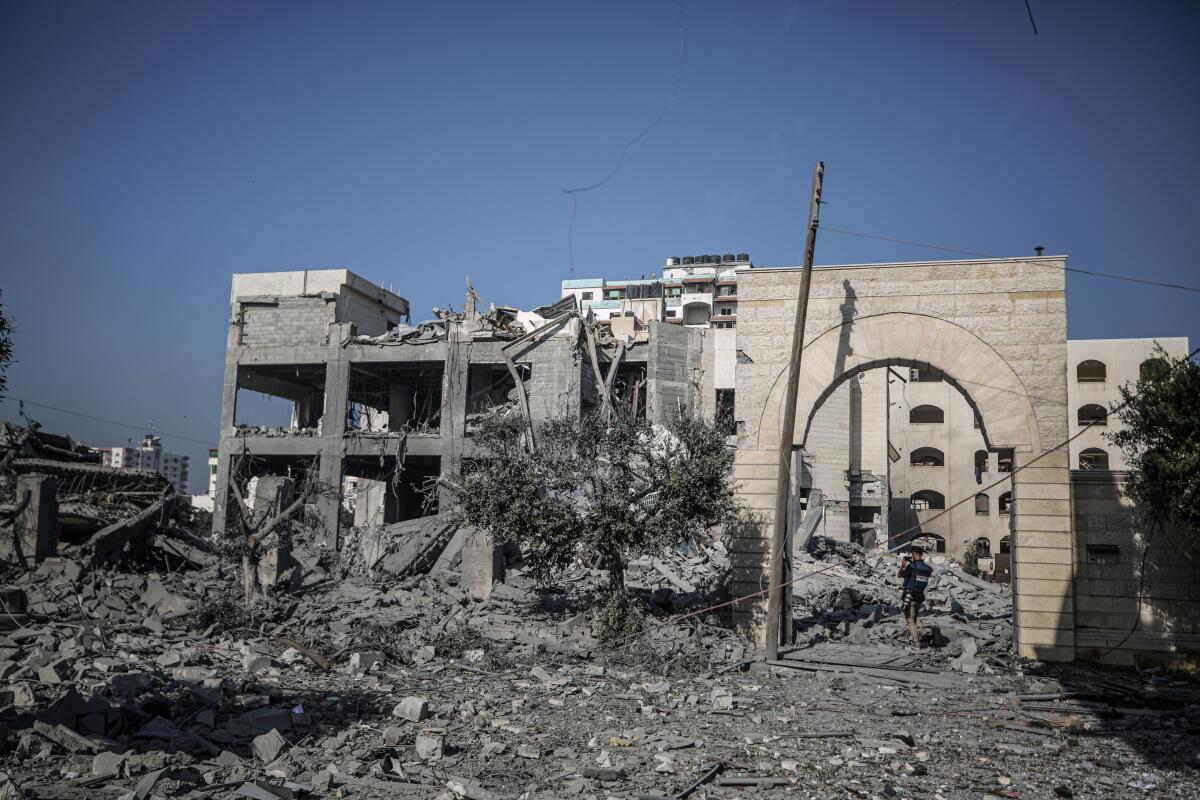
- Share via
Among the many tragedies in the Gaza Strip over the eight weeks since Israel began bombardment, and overshadowed by the death of more than 15,000 people, is the destruction of the main public library in Gaza City on Nov. 27. Some have accused Israel of deliberately targeting the library. But whether it did or not, the destruction of libraries in times of war and violent conflict is tragically common. It is more important than ever for librarians and the public to stand up against such attacks on knowledge and cultural heritage.
When libraries are attacked, more than the horrific destruction of books is involved. Libraries are cultural repositories. They hold collective memory, preserve cultural heritage, showcase societal development and afford individuals the opportunity for learning and growth.
Now is the time for policymakers to plan for the day after the fighting and bombing stops. This convulsion of violence impels a new boldness to break the cycle of conflict.
Libraries have been deliberately targeted during conflicts for decades. In Sarajevo in 1992, Bosnian Serb forces deliberately attacked and destroyed the National and University Library of Bosnia and Herzegovina. The Baghdad National Library was looted in 2003 as U.S. forces stood by. Nazis systematically targeted libraries and cultural heritage sites across Europe. Many of those libraries are still trying to replace or find the lost materials.
But we can also learn from efforts to save libraries, archives and cultural heritage in times of war. Sometimes war is foreseen. Librarians, archivists and heritage workers can proactively develop disaster management plans, using tactics developed by their predecessors.
Imagining possible futures beyond Israel’s Jewish supremacy is a political act for me, rooted in my people’s history.
The British Library and St. Paul’s Cathedral, for example, undertook measures to safeguard their most precious materials on the eve of World War II. Here, strategic collaborations proved crucial. Librarians at the British Library meticulously documented each book to track any items that might be damaged during the war ahead. Then, the British archives, museum and library evacuated collections from London. While many items left behind were damaged and burned from bombing, duplicate copies of damaged materials were available elsewhere, thanks to institutional cooperation. The National Library of Wales and other storage facilities, meanwhile, kept irreplaceable resources safe during the war.
Such efforts were international in scope. In 1939, Archibald MacLeish, librarian of Congress in the United States, worked with others to educate librarians and the public that an imminent threat from fascism loomed over countless books and manuscripts, and he lobbied the State Department, underscoring the urgent need to safeguard Europe’s cultural treasures.
Ukraine’s historical buildings, artifacts and digital archives are a target of Putin’s war. Here’s how the country is trying to preserve them.
These are but a few examples. Other institutions created in the face of attacks on libraries and cultural heritage continue today. The United Nations Educational, Scientific and Cultural Organization was created in 1945 in response to the destruction of cultural heritage during World War II. Initially focused on museums and archaeological sites, UNESCO’s mandate expanded over time and despite limited funds hindering direct action, the organization collaborates with affiliated international groups, fostering joint efforts to protect cultural heritage, especially in conflict zones.
Similarly, the International Committee for the Blue Shield, established in 1996, acts as a guardian for cultural heritage, with part of its aim to help safeguard libraries from attacks during conflicts.
The Jewish population of Dnipro has been decimated repeatedly over 350 years, but never erased. It’s an example all Ukraine can follow.
No initiative or organization is perfect, and there are ample criticisms of UNESCO and the committee. And while none of these events offers a ready-made solution to the destruction of Gaza City’s public library, we must look deeply at efforts and success stories from the past to consider how to stop further destruction of libraries in Gaza and elsewhere.
Today the implications of destroying libraries and cultural heritage go further than ever before. The destruction of libraries not only creates a distressing loss of invaluable knowledge, it creates a void in the data that inform models for artificial intelligence. As librarians, we must work to ensure that AI algorithms are being trained on data garnered from around the world, not stripped of human knowledge from any part of civilization — particularly the Middle East, which has suffered horrific attacks on libraries over the past 50 years.
Numerous strategies exist for preserving human knowledge, especially in times of war. Libraries and archives must adopt proactive measures to protect collections before a conflict arises. This includes creating catalog records for each item, relocating the most important and irreplaceable collections to secure places when possible, and establishing duplicate copies in print or through digitization, which stands out as a crucial preservation method.
We can emphasize prevention rather than recovery — both by working with our governments to prevent war and in our professional capacities to protect knowledge. While challenges on the ground, technological limitations and a lack of resources can sometimes make this unfeasible, we must always continue trying.
The preservation of human life must be prioritized. And yet, that should not and cannot be in contradiction with stopping attacks on libraries — or digitization of the knowledge they contain.
As librarians and as citizens we must unite to safeguard human knowledge and to ensure a future in which crucial chapters of human history and memory are not wiped out.
Laila Hussein Moustafa is an associate professor and librarian at the University of Illinois Urbana-Champaign School of Information Sciences.
More to Read
A cure for the common opinion
Get thought-provoking perspectives with our weekly newsletter.
You may occasionally receive promotional content from the Los Angeles Times.
